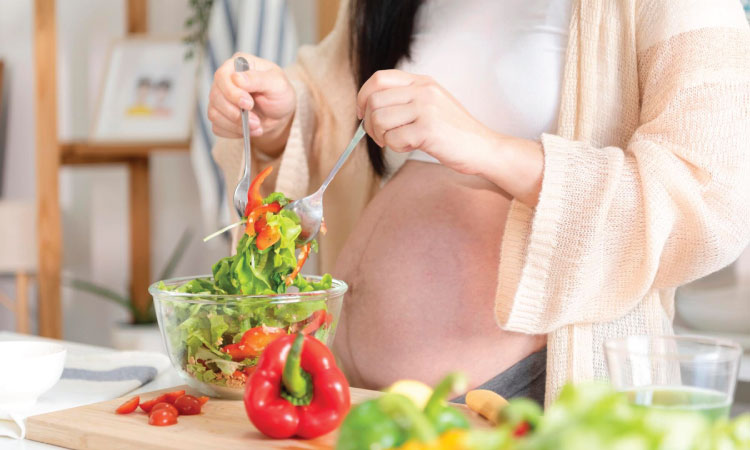Spicy food, famed for its intense flavors and fragrance, has long been an integral component in many cuisines across the globe. An often-asked question on forums is “Does spicy food cause miscarriages?” The idea that eating spicy food might increase the chance of miscarriage is a persistent myth.
You may be wondering whether the rumors you’ve heard about eating spicy food while pregnant are real or not if you enjoyed spicy cuisine before being pregnant and now you find yourself craving it more.
Do you have to avoid spicy meals now that you’re expecting, or can you still treat your palate and sate your need for the hot sauces you enjoy? Is there a connection between spicy food cravings and baby gender? The facts and myths about spicy food during pregnancy will be covered in this post.
Are Spicy Foods Safe For You?
Our panel gynaecologist and obstetrician Dr Ankita Patel Tayal warns that eating hot pepper during pregnancy can have some unpleasant side effects for the expecting mother, including heartburn, indigestion, and pain thereafter. When it comes to the unborn child, however, spicy foods pose no direct threat. If you’re not used to eating spicy cuisine and you find yourself craving for spicy food during pregnancy, start cautiously.
Pregnant women shouldn’t include a lot of spicy foods at every meal. Spicy foods can sometimes contribute to dehydration. Water consumption should also be maintained at a steady rate while eating spicy food while pregnant. While preparing spicy dishes, be sure to choose ingredients that meet quality criteria.
Related Reading: Hajmola During Pregnancy- Is It Safe?
While eating spicy meals occasionally may not cause any health issues during pregnancy, it’s important to remember that everyone has a different tolerance level. Each woman’s tolerance for spicy foods is unique, and what may cause discomfort for one person might not affect another.
Pay attention to your body’s responses and adjust your diet accordingly. Likewise, if you have digestive issues like irritable bowel syndrome (IBS) or acid reflux during your pregnancy, you might find that spicy foods make your symptoms worse.
Calculate Due Date With LMP
Are Spicy Foods Safe For A Developing Baby?
There isn’t conclusive evidence to suggest that consuming spicy food during pregnancy has a direct negative impact on fetal development. But the foods and flavors you enjoy during your pregnancy will be passed on to your unborn child.
Wondering how babies can taste spicy food in the womb? It is through the amniotic fluid that the flavors of the food that you eat are passed on to the unborn child.
Beginning as early as week 15, the baby’s taste buds are fully developed, and it begins to consume amniotic fluid. It is likely that by then, he or she is beginning to taste the food that their mother is eating.
According to research, the foods a mother consumes have an impact on her infant’s future food preferences. This means that exposing them to a wide range of spices and flavors may help them become more adventurous eaters.
Related Reading: 6 Spices To Eat And 6 Spices To Avoid During Pregnancy
Spice Foods And Your Pregnancy – Trimester Wise

It’s generally accepted that eating spicy meals in moderation is safe to do while pregnant. Because every woman has a different threshold for spice, it’s important to monitor personal responses and know how spicy food affects pregnancy. The pros and cons of eating spicy food while pregnant are as follows.
First trimester
During the first three months of pregnancy, a lot of women feel nauseous and have morning sickness. This is a time when cravings and food aversions start to appear. Many women who were previously not fans of spicy food may develop a strong desire for it during this time.
Here are some general pros and cons of consuming spicy food during the first trimester:
Pros
- Spices can make meals more appealing, especially during the first trimester, when a woman’s taste preferences shift. Spicy tastes may stimulate hunger and alleviate nausea in some people.
- Many spicy ingredients, such as chili peppers, contain antioxidants like capsaicin. Antioxidants are important, especially during pregnancy.
- Some studies suggest that spicy foods can temporarily increase metabolism, potentially providing a small energy boost.
- During the first trimester, when hormonal changes can cause mood swings, some women may benefit from eating spicy foods. This is because it is found that spicy food might cause your brain to release endorphins (source), which are substances linked to positive emotions like pleasure and well-being.
Related Reading: 9 Things To Do When You Don’t Feel Like Eating During Pregnancy
Cons
- Spicy foods can exacerbate morning sickness in some pregnant women. So it can be bad for early pregnancy weeks.
- The consumption of spicy foods may occasionally result in gas, bloating, and indigestion. As the body adjusts to hormonal changes, these discomforts may be more severe during the first trimester.
- Hormonal changes during pregnancy can relax the lower esophageal sphincter, leading to an increased risk of heartburn. Spicy foods may further contribute to heartburn and gastrointestinal discomfort.
Second Trimester
While individual reactions to spicy foods vary, the following are some advantages and disadvantages of eating spicy foods during the second trimester of pregnancy.
Pros
- Capsaicin in spicy peppers may have pain-relieving properties (source). When the woman is getting close to the end of her second trimester and starting to experience cramps and pain, this can help.
- Some spices have digestive benefits and can aid in digestion
- Consuming certain spices helps stimulate appetite. It is beneficial for pregnant women who are experiencing a loss of appetite.
Cons
- Spicy foods may contribute to acid reflux, a burning sensation in the chest and throat.
- Spicy foods can contribute to the exacerbation of hemorrhoids (source), a common issue during pregnancy due to increased pressure on blood vessels.
- Spicy foods have the potential to cause sweating, which can be uncomfortable during pregnancy because hormonal fluctuations can already have an effect on the body’s temperature that can cause discomfort.
Related Reading: Eating Betel Leaves (Paan) During Pregnancy
Third Trimester
The third trimester is a time of intense physical change and growing pains and discomforts for the expecting mother. As with any other time during pregnancy, eating spicy food in the third trimester may have some pros and cons.
Pros
- During the third trimester, the enlarging uterus puts pressure on the intestines, which compromises digestion. Some spices may help accelerate digestion, which in turn reduces the usual digestive difficulties that pregnant women have.
- Eating spicy foods can be particularly beneficial during the third trimester as they aid in nasal passage clearance and alleviate congestion, which is common during this time.
- The anti-inflammatory properties of some spices can be beneficial at this stage of pregnancy.
Cons
- The stimulant effects of spicy foods may interfere with sleep, contributing to insomnia. Pregnant women already have issues sleeping in the third trimester and having spicy food for dinner may aggravate them.
- Pregnant women must take extra care to stay hydrated, and spicy foods can have the opposite effect. Eating spicy food and not drinking enough water can lead to dehydration, which can cause a lot of problems, including preterm labor during the third trimester of pregnancy.
- Spicy foods can contribute to digestive discomfort, including heartburn and indigestion, which are common in the third trimester.
So, Does Spicy Food Cause Miscarriage?

Dr Ankita Patel Tayal, practising obstetrician for last 10 years says that no scientific evidence has been found to support the claim that spicy food can cause miscarriage in the first trimester. During pregnancy, though, the body makes enough heat on its own. Eating foods that are hot or spicy can also cause a rise in core temperature (source). Thus, spicy food could disrupt the temperature balance. During pregnancy, it is not good for your core temperature to rise (source). That is one of the causes of developmental abnormalities, or it may cause miscarriage. So, it is not a good idea to make spicy food a regular part of your diet.
Common Myths And Facts On Eating Spicy Food During Pregnancy
In order to avoid misunderstandings, it’s critical to debunk myths about eating spicy food while pregnant. The reality is that moderation and personal tolerance are key, regardless of the beliefs of those who think it damages the unborn child or causes labor. Pregnant mothers looking to maintain a healthy, balanced diet must learn to distinguish between facts and fables.
You can learn more about the facts and common misconceptions surrounding spicy food while pregnant in the table below.
SI Num Myths about Spicy Food During Pregnancy The Truth 1 Spicy food harms the baby in the womb Generally speaking, eating spicy food in moderation is safe to do while pregnant. Although individual sensitivities may differ, it is unlikely that the baby will suffer direct harm from the spiciness in the mother’s food. 2 Spicy food causes pregnancy complications. Spicy foods are not linked to complications when consumed in reasonable amounts. 3 Spicy Food Aggravates Morning Sickness Foods high in spice don’t always make morning sickness worse. Yes, it aggravates morning sickness in some women. However, certain spices, like ginger, have anti-nausea qualities and can help with morning sickness. 4 Spicy Food Causes Birth Defects There isn’t any scientific proof that eating spicy food while pregnant increases the chance of birth defects. More contributions to birth defects come from genetic and environmental variables. 5 Spicy Food Causes Excessive Weight Gain in Pregnancy The general dietary habits and lifestyle have an impact on weight gain during pregnancy. Spicy food, in moderation, is not a direct cause of excessive weight gain. 6 All Spicy Foods Have the Same Impact on Pregnant Women Individual tolerances and preferences vary, so the impact of spicy foods can differ among pregnant women. Not all spicy foods elicit the same reactions in everyone. 7 Spicy Food Increases the Risk of Gestational Diabetes The spiciness of food is not a significant factor in the development of gestational diabetes. Factors such as genetics and overall diet play more prominent roles. 8 All Pregnant Women Should Avoid Spicy Food While some women may need to limit spicy food due to individual tolerances or conditions, moderate consumption is generally considered safe for most pregnant women. 9 Spicy Food Leads to Preterm Birth Ingesting spicy meals, particularly in significant amounts, can lead to gastrointestinal irritation, causing stomach cramping akin to contractions. However, these contractions are incapable of inducing labor. 10 Spicy Food Leads to Preterm Birth There is no conclusive evidence supporting the claim that spicy food leads to preterm birth. Preterm birth is multifactorial, and diet alone is not a significant factor. 11 Spicy Food Causes Heartburn in All Pregnant Women While some pregnant women may experience heartburn due to hormonal changes, it is not universal. Spicy food may exacerbate heartburn for some, but not all, pregnant individuals. 12 Spicy Food Alters the Baby’s Taste Preferences The development of tastebuds in babies occurs at about 15 weeks. While it is true that some flavors can be transferred to amniotic fluid and consumed by the baby, their impact on the newborn’s taste preferences is insignificant. Exposure to a wide variety of flavors enriches the refinement of one’s palate. 13 Spicy food increases the risk of allergies in the baby. There is no proof that a mother’s intake of spicy foods while pregnant increases the risk of food allergies in her unborn child. 14 Spicy food impacts the unborn baby’s sleep patterns. There is no established link between spicy food and the unborn baby’s sleep patterns. 15 It leads to dehydration. Partially true. While spicy foods may increase thirst, they do not cause dehydration when consumed with an adequate amount of fluid. 16 Spicy food causes hemorrhoids. Consuming spicy foods does not directly cause hemorrhoids. (it may aggravate the existing hemorrhoid issue, though.)
Conclusion

Last but not least, for pregnant women looking for a balanced diet, it is essential to dispel the myths and check the realities about spicy food consumption during pregnancy. Despite ongoing myths regarding potential risks to the fetus, induction of labor, and other issues, research indicates that spicy foods, when consumed in moderation, are typically harmless.
When making nutritional choices during pregnancy, it is crucial for women to consider their own health and tastes, taking into account the role of individual tolerance and preferences. By separating fact from fantasy, pregnant mothers are able to eat a varied and delicious diet while going through this important time.


